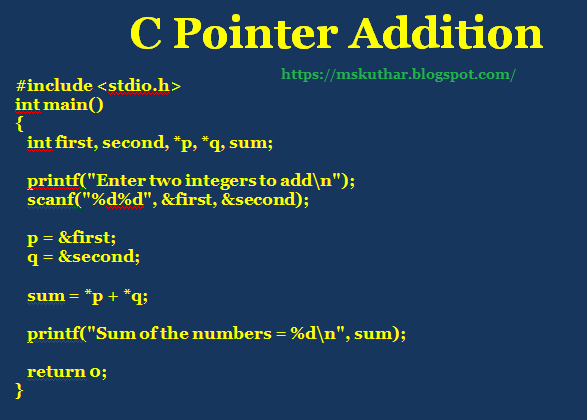C Pointer Addition
- We can add a value to the pointer variable. The formula of adding value to pointer is given below.
new_address= current_address + (number * size_of(data type))
void main(){
int number=50;
int *p;//pointer to int
p=&number;//stores the address of number variable
printf("Address of p variable is %u \n",p);
p=p+3; //adding 3 to pointer variable
printf("After adding 3: Address of p variable is %u \n",p);
}
Output
Address of p variable is 3214864300
After adding 3: Address of p variable is 3214864312
- As you can see, address of p is 3214864300. But after adding 3 with p variable, it is 3214864312 i.e. 4*3=12 increment.
- Since we are using 64 bit OS, it increments 12. But if we were using 32 bit OS, it were incrementing to 6 only i.e. 2*3=6. As integer value occupies 2 byte memory in 32 bit OS.
 |
| Pointer Addition |
#include <stdio.h>
int main()
{
int first, second, *p, *q, sum;
printf("Enter two integers to add\n");
scanf("%d%d", &first, &second);
p = &first;
q = &second;
sum = *p + *q;
printf("Sum of the numbers = %d\n", sum);
return 0;
}
Output
Enter two integers to add
5
6
Sum of the numbers =11
C program to add numbers using call by reference
#include <stdio.h>
long add(long *, long *);
int main()
{
long first, second, *p, *q, sum;
printf("Input two integers to add\n");
scanf("%ld%ld", &first, &second);
sum = add(&first, &second);
printf("(%ld) + (%ld) = (%ld)\n", first, second, sum);
return 0;
}
long add(long *x, long *y) {
long sum;
sum = *x + *y;
return sum;
}
